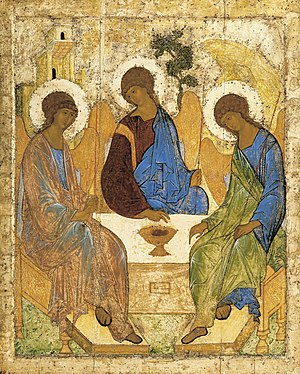
1411 or 1425-27
Atheism has come down in the world since the days of the Stoic philosophers (and that was millennia ago). For example, a philosopher argues:
Does God have every power? He has the power to create and destroy universes, but does he have the power to sneeze or digest food or pick his nose? Those powers require possession of a body with a certain anatomy, but God has no such body, being disembodied. Does he have the power to decay or split or emit radiation? How could he have these powers given his immaterial nature? Does he have the power to come down with a cold or be bed-ridden or have the runs? Surely not: God has the powers that are proper to his divine nature, not any old powers that things of other natures have—animals, plants, atoms. God essentially lacks certain powers as a condition of being who he is. He has the powers of a god not of a worm or cactus plant. Everything must lack something in order to be something, i.e., to have a determinate nature.Colin McGinn, “A Disproof of God’s Existence” at Skeptic
A commenter responds, “ I think this line of reasoning says more about the limitations of language (and by extension human thinking) than about the existence or otherwise of god. ”
Omnipotent means the power to do any possible thing. Christians, for example, say that God “became man and suffered for us under Pontius Pilate.” So the answer to McGinn’s questions (“does he have the power to sneeze or digest food or pick his nose”) is yes, though it requires incarnation in a human body.
“and on the third day he rose again.” He can do that too, if he is God. Anyway, read the book.
Then: “He has the powers of a god not of a worm or cactus plant.” Actually, the powers of God comprise those powers. As they used to say: The higher descends to the lower; the lower does not ascend to the higher. That is, God can trivially have the powers of a worm but a worm could never have the powers of God.
But if we turn back to omnipotence for a moment, God, who brought the worm into being knows everything about it, every cell and quark, at all times and in all places—and everything about every other entity, material or non-material—and can do things merely by deciding to do them. That is what omnipotence means.
It tells us something about our culture that arguments based on such simple misconceptions as “How could he have these powers given his immaterial nature?” are even taken seriously, let alone made by philosophers.
It’s almost as if we were back in the Stone Age, arguing about whether a man’s soul could be kept inside a nut or, no, only a woman’s soul could be kept inside a nut.
One problem is that naturalism (nature is all there is), often called “materialism,” undermines our understanding that information is, by nature, immaterial.
It’s not atheism that makes people thick, it’s materialism. It distorts one’s sense of how things hold together, how they work.
![The Long Ascent: Genesis 1â 11 in Science & Myth, Volume 1 by [Sheldon, Robert]](https://images-na.ssl-images-amazon.com/images/I/51G-veeEcdL.jpg)
Note: Rob Sheldon author of Genesis: The Long Ascent and our physics color commentator, writes to say,
My own version of a defense against the atheist theodicy, is that we cannot know exactly the position and momentum of an electron. This is just as impossible as a “square circle”, but not as intuitive, because QM isn’t very intuitive. Therefore, philosophy doesn’t always know what is knowable; it is always discovering new limitations to its power and reach.
This whole thing about the 3 omni’s being inconsistent and therefore God can’t exist, makes as much sense as saying “an electron cannot possess a defined position and momentum simultaneously, therefore electrons do not exist.” After all, how do we know that omniscience, omnipotence and omnibenevolence commute?
What it really shows is that philosophers are unhappy with their limitations and prefer to blame others for their deficiencies.
See also: Religious Nones: The bigger picture shows increasing polarization The rise of the Nones means something important: Those who care about the Big Questions are more VISIBLY polarized. In politics, the Religious Nones are the largest group in the Democratic Party (30%) and 70% of declared Republicans believe in the “God of the Bible.” The “religious left” seems to be largely an artifact of thinkmags today, although it was an important force decades ago.
and
The Confused World of Modern Atheism (Mosaica Press, 2016)
Follow UD News at Twitter!